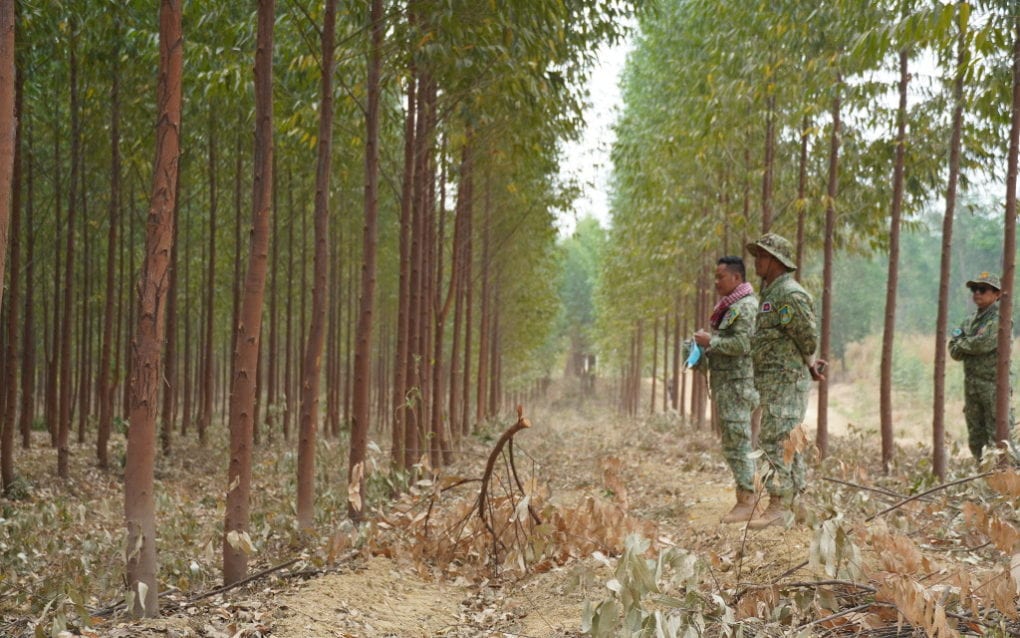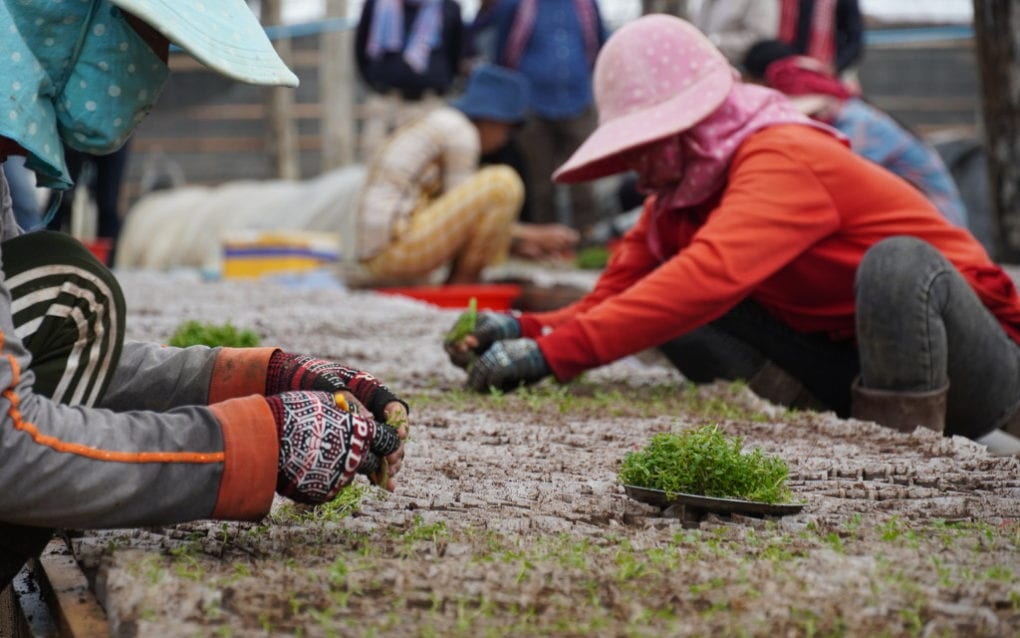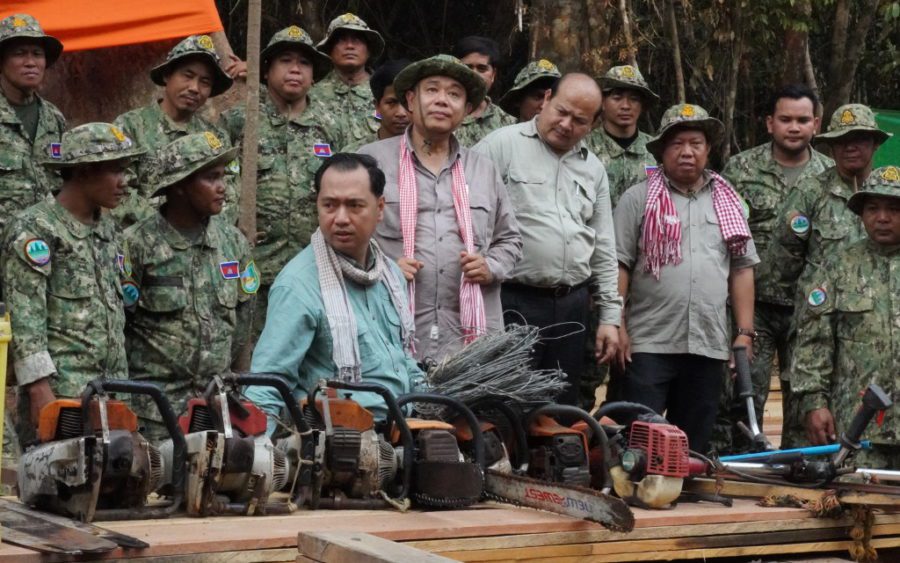A new report from the Prey Lang Community Network links increasing deforestation in the Prey Lang Wildlife Sanctuary to a yearlong ban on independent patrols, as forest activists were this year again stopped from activities in the forest and conducting their annual tree-blessing ceremony.
The Global Forest Cover dataset cited in the newly-released monitoring report shows 7,573 hectares of forest cover lost between June 2019 and June 2020, up 73 percent from the 4,373 hectares lost between June 2018 and June 2019.
The report authors — three University of Copenhagen researchers working “on behalf of” PLCN — also found more than 10,000 hectares of forest canopy disturbances, a more detailed metric of satellite data which can indicate selective logging activity. The number of canopy disturbances was on par with the amount found in the last period, the report says.
“This year has demonstrated that the presence of PLCN patrols does deter illegal loggers,” the report says. “The lack of community forest patrols has provided the perfect setting for unabated and uncontrolled deforestation and forest degradation.”
Amid restricted access to the sanctuary, PLCN members also documented 296 instances of illegal activities within the sanctuary — namely finding stumps and planks from selective logging, as well as forest clearing and transported timber — between June 2019 and last June, down to about a quarter of the illegal activities they found in the previous period.
Hoeun Sophea, PLCN president and a representative in Kampong Thom province, said the grassroots group had been stopped from patrolling in September or October 2019, before authorities finally banned them completely ahead of a forest blessing ceremony one year ago.
Sophea said the group tried to organize a forest blessing ceremony again this year at the sanctuary’s Phnom Chi mountain on February 25 and 26, but they were barred by authorities before the ceremony’s date.
“Nowadays, even if we requested [permission] from the Ministry of Environment, the authorities, the provincial governor, the district governor, the [provincial environment] department, and so on, they’d still reject it,” he said.
The PLCN leader said the group tries to hold gatherings and patrols as usual, but provincial and local authorities consistently stop them, and have tried to compel group leaders into signing a contract to stop conducting all patrol activities.
“We cannot do as [is written] in the contract because we see it as something that is not legal,” he said. “I am a protector of natural resources. Why do the authorities or the government require us to make a contract requiring us to request permission before performing a ritual or patrol? There are many conditions. I do not understand it. We do not understand our Cambodia.”

The PLCN report also criticizes USAID’s $21-million Greening Prey Lang project in the area as taking a “harmful approach” to forest conservation for condoning the Environment Ministry’s ban on community-led forest patrols.
“By silently approving the intimidation and de-legitimization of PLCN, USAID and Tetra Tech [the engineering firm implementing the project] are sabotaging the efforts of existing local and indigenous grassroots groups to conduct crucial forest monitoring,” it says.
In response to questions, USAID shared a statement prepared for a different set of questions that said that it was “concerned” about both sustained deforestation and the arrest of forest activists, adding that the Greening Prey Lang project has assisted both Environment Ministry patrols as well as community patrols involving PLCN members.
“USAID has offered to facilitate dialogue between the Ministry and PLCN to achieve an agreement on PLCN’s access to protected areas to conduct monitoring,” its statement said. “Joint patrolling between community members — including members of PLCN — and government rangers continues.”
The statement continued that the U.S. ambassador in Cambodia and the USAID Cambodia director had met with the Environment Ministry to discuss both Prey Lang deforestation and community patrollers, without specifying the result of those meetings. The agency did not directly address criticisms included in the PLCN report.
The report urges the Cambodian government to recognize the value of grassroots community patrollers and stop persecuting them for conducting patrols, as well as assess the impacts of a planned 500-kilovolt transmission line splitting the sanctuary and hold a public consultation.
In response to questions about the monitoring report, Environment Ministry spokesperson Neth Pheaktra said the government did not need to respond to reports by PLCN and Amnesty International, which also released a statement about satellite-captured deforestation inside the sanctuary.
He said these reports did not reflect the reality in the protected area, adding this was an “organised campaign with malicious intent to subvert the government on the management and conservation of natural resources.”
“The report by Amnesty International is intended to discredit the government under the cover of human rights, freedom and democracy,” he said via Telegram. “Amnesty International organisation tends to provide support to those who violate the law without shame and encourage[s] them to continue breaking the law.”
Pheaktra said that there were still forest crimes occurring but at a small scale, and added that reports were not “up-to-date” with the ministry’s reports from last year, claiming the state-employed rangers had good results in preventing and responding to natural resource crimes.
The official also reiterated problems he expressed with PLCN after the organization was first banned from patrols last February, saying it was not properly registered in line with the Law on Associations and NGOs.
“They think that only their group is the only natural resources protector,” he said. “In reality, they just want to cause conflict, create anarchy and continue to encourage law abuses. That’s an insult to the dedication of park rangers and protected area communities who are striving hard for the protection and conservation of natural resources.”

Venerable Sok Rina, a monk based in Phnom Penh, said he tried to join the forest blessing ceremony in order to understand the situation in Prey Lang Wildlife Sanctuary, and when the blessing was stopped, he instead visited the Orda Skor community protected area in Kampong Thom’s Meanrith commune.
Rina said the community brought the urban visitors to a part of their land that was also claimed by an economic land concession, and it was heavily degraded or cleared, he said. He felt the community did a good job protecting their other land areas, compared to the general state of Prey Lang, which is overseen by state-employed rangers.
“The difference is that [the community land] is better protected, and [community patrollers] are more open to access and more open to promoting the forest,” he said. “I observed that the older people there are having fun when they patrol the forest before it was banned, but now, when the ban came, it is difficult for activists to protect Prey Lang. The activists are being treated like criminals.”
An Sreyoun, a Phnom Penh university student, also met the Orda Skor community, but she said she was disappointed to hear about the obstruction from authorities, saying the community had no intention to destroy any part of the forest but rather protect it.
“I find that they are still trying, they still have brave hearts, they do not give up, despite the ban,” she said. “And by visiting the forest in that area, I saw a lot of deforestation, and there were both old and new traces [of logging], especially inside Prey Lang forest. I did not go in, but I got close enough to see the destruction, and it is very large.”
Sreyoun said she felt the community patrols were important. She said she wanted to urge authorities to arrest the perpetrators of major forest crimes, because the state-employed rangers should be competent enough to tell who is committing illegal activities inside the sanctuary.
Almost two weeks before PLCN’s proposed ceremony, the Environment Ministry in mid-February conducted a camping tour in the Prey Lang Wildlife Sanctuary. During a media briefing on the tour, Pheaktra said the source of illegal logging was the domestic furniture industry, saying deforestation could be reduced if Cambodian consumers switched from buying luxury wood furniture to wood from farmed trees.
Nearby timber concession Think Biotech has been accused numerous times by forest activists of laundering luxury wood abroad, but Pheaktra touted the concession for its 34,000 hectares of farmed trees that would be used for furniture.
Pheaktra added that selective logging was less of a problem, and any forest clearing was often about land deals.
“According to what we have inspected, there are middle brokers from other provinces that have their [clearing] network, giving money to those people [in the network], sometimes,” he told ceremony attendees. “Some people go to log for selling [land] to them. Sometimes, they occupy land for selling to them at a cheap price.”
Activist Heng Sros disagreed with Pheaktra’s assessment of deforestation, saying in mid-February that companies like Think Biotech and its sister company, Angkor Plywood, have created a network that allows them to export valuable timber from the sanctuary without paying taxes.
“The export of timber, the smuggling of timber without paying to the state are the main reasons for deforestation in Cambodia,” he said. “If the Ministry of Environment spokesperson claimed [the opposite], it seems they are protecting perpetrators that are destroying [forest] for export.”
Sros said he and a small team of forest activists spent two months late last year and early this year entering Prey Lang in Kratie province, and they counted hundreds of trucks hauling timber toward Think Biotech. He was among the five activists arrested in Kratie province last month for entering the protected area.
Lu Chu Chang, the Taiwanese national and long-time timber advocate who chairs Think Biotech and Angkor Plywood, has frequently denied forest activists’ accusations of laundering timber.












